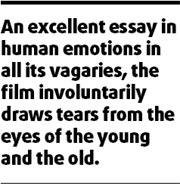Bollywood finally grows up with a switch in focus
Updated: 2008-01-10 07:18
It was the year Bollywood finally grew up. And it made successful movies about everyday, mundane events. At the end of last year, it actually took a huge gamble rolling out an expensive docu-drama on the real-life story of a 9-year-old dyslexic child.
The bigger surprise was that the film, made with great sensitivity and directorial sincerity by actor Aamir Khan, not only won critical acclaim but also, more importantly, proved a huge hit at the box-office.
Khan's maiden directorial venture, Taare Zameen Par (TZP), has been hailed universally. Even snooty film critics who inevitably sniff out flaws in the usual Bollywood fare endorsed TZP for compulsory viewing.

A film shorn of the staple fare of romance and violence, TZP entertains, as well as educates viewers about disabled people.
The story of the dyslexic child depicts how both his parents and schoolmates fail to come to terms with his disability. They wonder why he cannot be like every other child his age.
On his part, the dyslexic child, portrayed masterfully by Darsheel Safary, cannot understand why the world, including his parents, cannot see things from his perspective.
If he is a backbencher in class, failing to remember by rote the nine-times table, he is a natural at painting lilies or depicting a landscape. But the world around him, being obsessed with stereotypes, does not appreciate the child's "other" gifts.
Soon, his parents pack him off to a boarding school, where he is fortunate to find a teacher who is alive to his needs and has the courage to see the world through his dyslexic eyes.
An excellent essay in human emotions in all its vagaries, the film involuntarily draws tears from the eyes of the young and the old, and is now running to packed houses across the country.
Indeed, such is the success of TZP that there is near unanimity that not only would it emerge the biggest grosser of the year, but equally certainly it would bag all the top awards.
Safary, the real hero of the film, is on course to win the Best Debut by an Actor award. Khan, who plays his teacher, is a sure shot for the Best Actor award. Besides, Khan is set to walk away with the Best Director award.
Only a few years ago, a film about the hidden abilities of a child the world calls "disabled", and which focuses on parenting and teaching of such a child in normal times, would not have found any takers at the box-office.
But the success of TZP underlines the maturing of cinema-going audiences. A few years ago, no Bollywood producer would have put up money for a completely off-beat story like the one depicted in TZP. Khan had faith in the project. And his gamble has paid off.
Quite aside from TZP, which, of course, was the biggest gamble, with no expense spared in its making, a number of off-beat films last year wooed the box-office.
The new-age cinema found its takers, especially in big urban centers, paving the way for Bollywood to turn away from the staple fare of boy meets girl, boy loses girl only to find her in the last reel, and everyone lives in blissful matrimony afterward.
Of course, there were a couple of formula hits in Om Shanti Om, Namastey London and Heyy Baby, but it was the success of new-age films which marked a fresh beginning in meaningful cinema by Bollywood.
Another big hit that defied the Bollywood stereotype and rang in the cash registers at the turnstiles was Shah Rukh Khan's Chak De India.
Based on the real life story of the goalkeeper of the Indian hockey team in the early 1950s, its understated patriotic appeal struck a chord with the audience.
Shah Rukh, in the role of a coach, discarded his usual mannerisms and shunned over-acting to give one of his best performances.
Then there was the low budget but high-brow comedy Bheja Fry, which won accolades for its wit and humor.
Made on a shoe-string budget, Bheja Fry earned money many times over its original cost.
The Star/ Asia News Network
(China Daily 01/10/2008 page9)
|
|
|
|
|
|